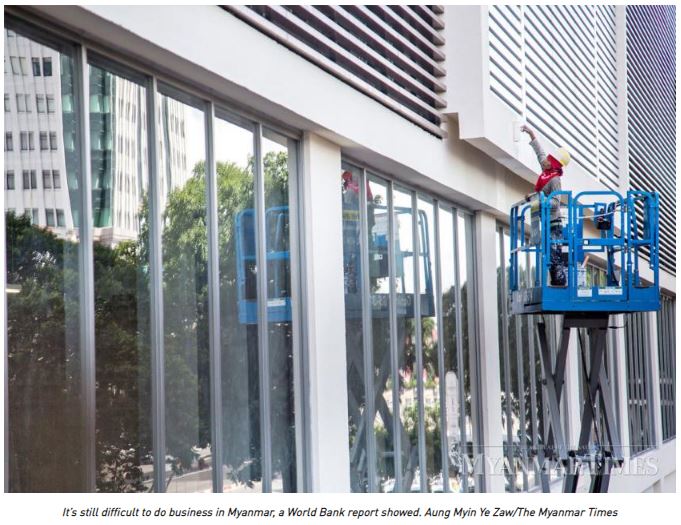Myanmar still weak in enforcing contracts, protecting minority investors
Myanmar has done undertaken two reforms to improve access to power supply and the ease of starting a local business, according to the latest report from the World Bank. However, pace of reform on most regulations affecting the private sector remain stagnant.
In the newly-released World Bank’s 2019 Doing Business rankings, Myanmar ranks 171th out of 190 economies in the overall ease of doing business, unchanged from last year’s position. It is the third consecutive year where the country fails to advance its ranking, remaining as the worst place in ASEAN to conduct business.
Economies are ranked on their ease of doing business, from 1-190, based on the average of each economy’s ease of doing business scores for the 10 topics, which capture several important dimensions of the regulatory environment as it applies to local firms. The analysis provides quantitative indicators on regulation for starting a business, dealing with construction permits, getting electricity, registering property, getting credit, protecting minority investors, paying taxes, trading across borders, enforcing contracts and resolving insolvency. An economy’s ease of doing business score is reflected on a scale from 0 to 100, where 0 represents the lowest and 100 represents the best performance. Myanmar scores an average of 44.72, which is the lowest in ASEAN, compared to the second lowest-scored Laos with 51.26 and the regional average for East Asia and the Pacific with 63.41.
Key weaknesses
Aspects with the lowest scores (out of 100) for Myanmar include getting credit (10.00), resolving insolvency (20.39), enforcing contracts (24.53) and protecting minority investors (25.00). Meanwhile, areas which perform the most poorly compared to other economies (out of 190 countries, with 1st being the best) are enforcing contracts (188th), protecting minority investors (185th), getting credit (178th) and trading across borders (168th) as well as resolving insolvency (164th). These are key aspects which the government needs to work hard on.

For example, Myanmar businesses need an average of 1160 days to enforce a contract, which is almost double of the East Asia and Pacific average of 581.1 days.
Last year’s index reported that Myanmar made registering property less costly by reducing the stamp duty and improved access to credit information by adopting a regulation allowing the establishment of credit bureaus.
Many economies in the region have undertaken more reforms. China has the second highest number of reforms per economy, with seven reforms. For example, Beijing made dealing with construction permits less cumbersome by streamlining the process of obtaining a building permit, and also made getting electricity easier in Beijing and Shanghai by expanding network capacity so that all connections of power loads of 160kW or less are now made directly to the low voltage network and free of charge.
Within ASEAN, Malaysia implemented six reforms and made starting a business easier by introducing an online registration system for the goods and service tax. It also made property transfer simpler by implementing an online single window platform to carry out property searches. Thailand made paying taxes easier by enhancing its online platform for calculating and filing corporate income tax. Indonesia, the Philippines and Vietnam each carried out three reforms.
Myanmar’s lack of improvement in this regard will be widely seen as a major policy failure by the incumbent government, which has repeatedly committed to elevating the country into the top 100 economies in the index by 2020. It is clear that the target will not be met.
Improvements made
Nevertheless, Myanmar managed to make progress in other areas of business. Among the ten barometers, Myanmar made improvements on starting a business (score 77.33) and power supply in Yangon (55.67).
Nay Pyi Taw made starting a business less expensive by reducing the registration fee, and improved the monitoring and regulation of power outages by beginning to record data for the annual system average interruption duration index (SAIDI) and system average interruption frequency index (SAIFI). The country also made getting electricity more transparent by publishing electricity tariffs online.
Still, there is a long way to go for the reform efforts in this frontier economy. For example, starting a new business takes 1.5 days in Singapore, compared to 14 days in Myanmar. It is also difficult for businesses in Yangon to secure electricity, taking 77 days, compared to 24 days in Kuala Lumpur.
Source: https://www.mmtimes.com/news/myanmar-still-weak-enforcing-contracts-protecting-minority-investors.html


 English
English




